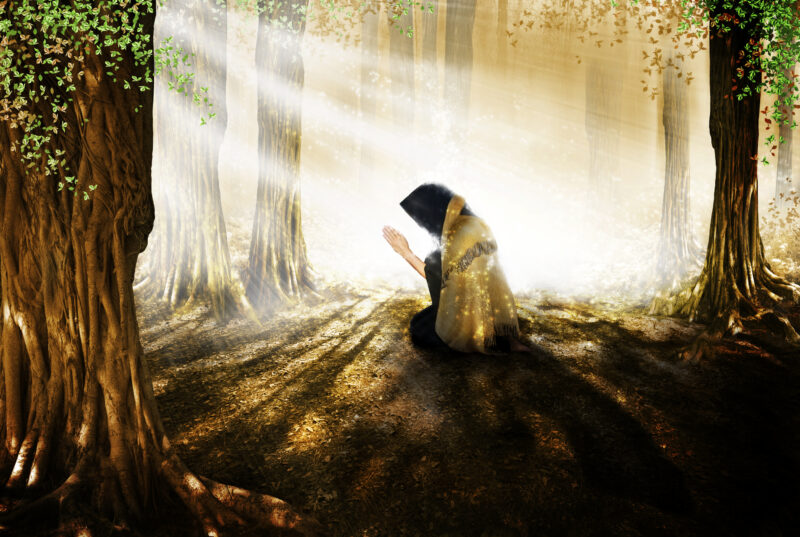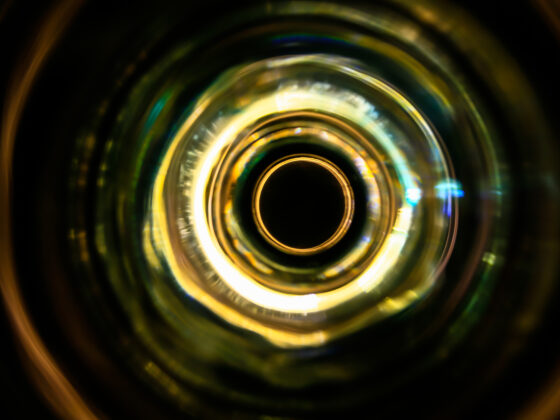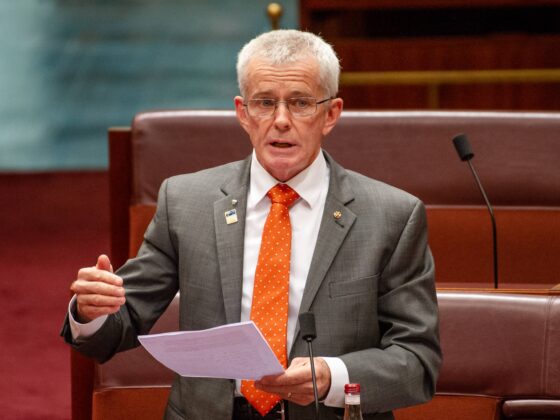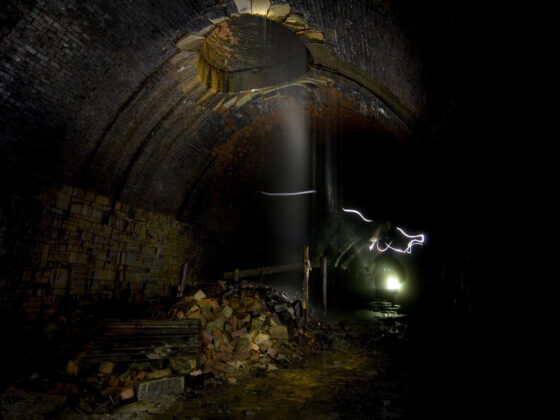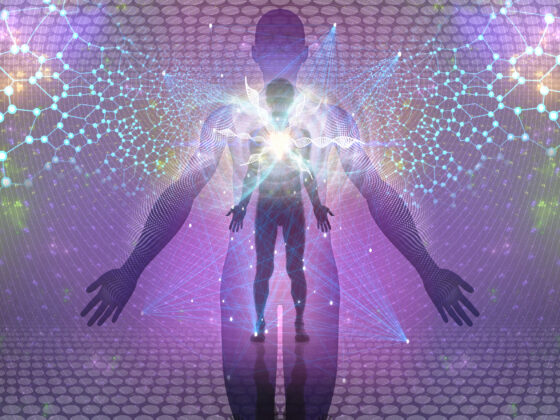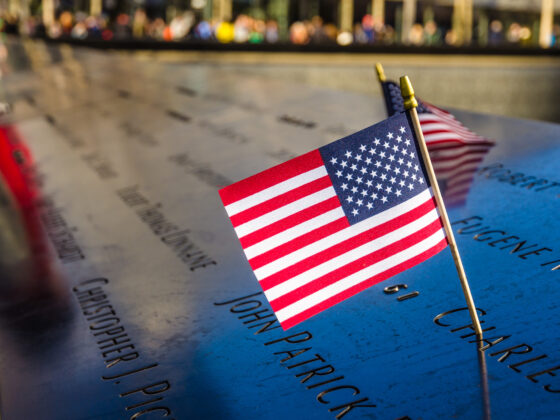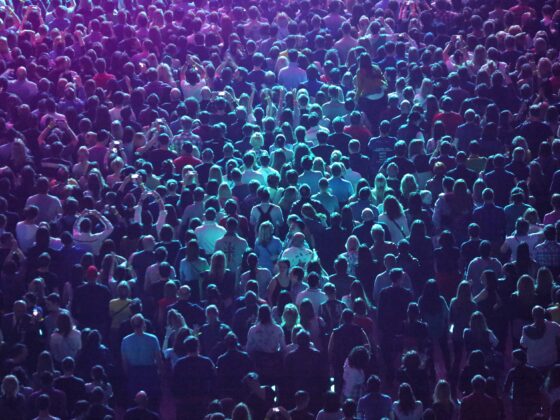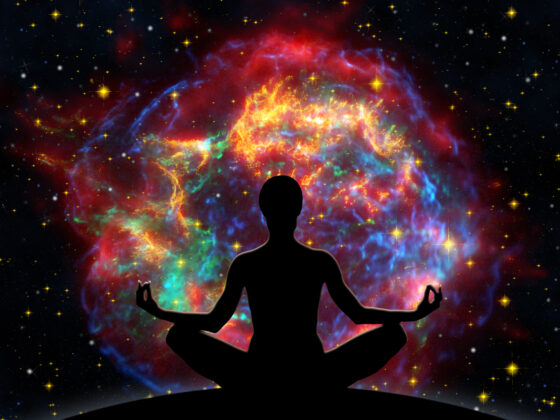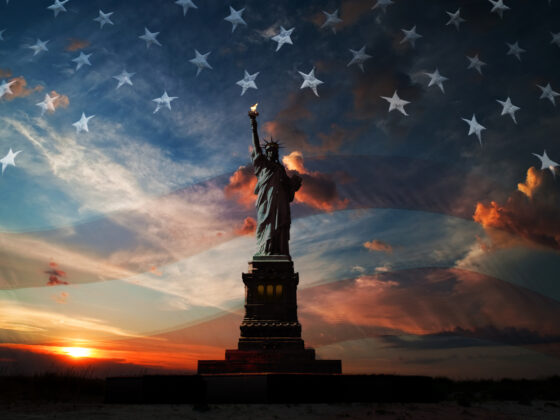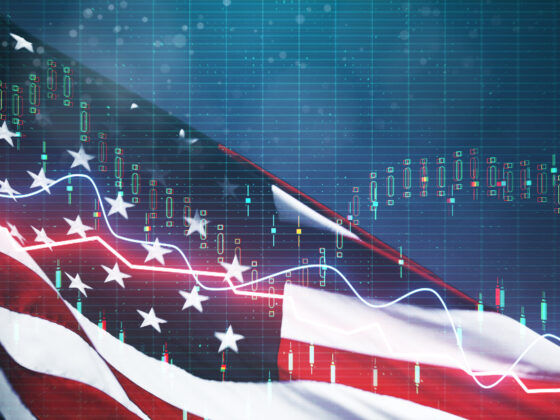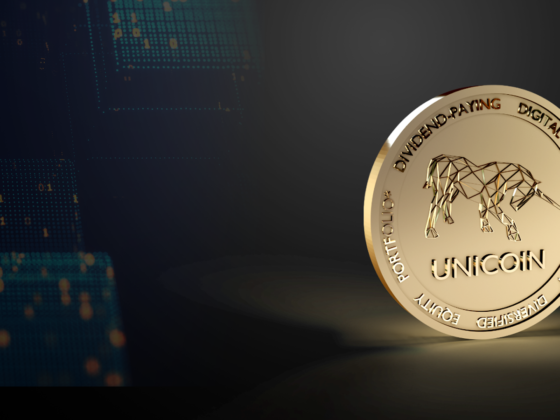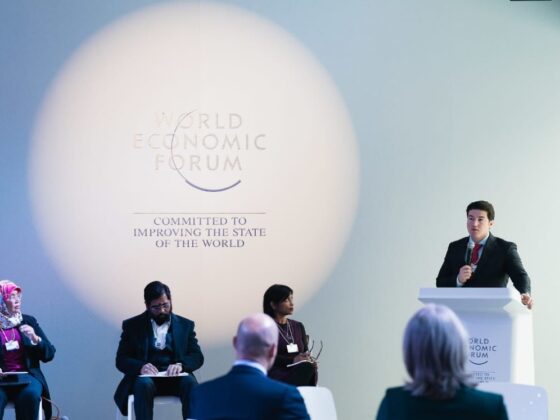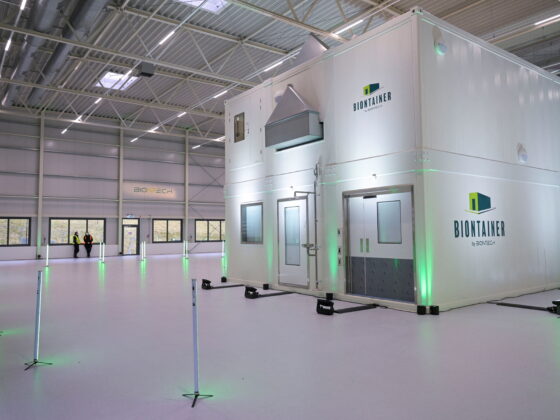Hungry, beaten, and drugged, we had forgotten theology and the Bible. We had forgotten the “truths about the Truth,” therefore we lived in “the Truth. – Richard Wurmbrand, Tortured for Christ
This month, I decided to write my inspirational essay on the power of prayer. I confess it hasn’t been easy. In two days, I leave Los Angeles for Costa Rica to live closer to the land. I’m looking forward to it but preparing for this journey has been time consuming and it’s been difficult to keep up with my writing. At night, after having helped with my grandkids all day, I would try to write and find myself drifting off to sleep. I doubt I could have finished this essay if I hadn’t had an experience a couple of weeks ago that inspired me and gave me renewed energy to do so.
My daughter was out of town on the weekend and so on that Sunday, I took my grandsons to the church my daughter attends, Newbury Park First Christian Church. I rarely attend church myself, preferring to worship while hiking in the mountains. I agree with Anne of Green Gables who said:
“Why must people kneel down to pray? If I really wanted to pray I’ll tell you what I’d do. I’d go out into a great big field all alone or in the deep, deep woods and I’d look up into the sky—up—up—up—into that lovely blue sky that looks as if there was no end to its blueness. And then I’d just feel a prayer.”
So, it was quite a surprise to find that Pastor Devan Bumstead’s sermon that morning was about, yes, you guessed it—prayer. What are the odds.
I believe in the power of prayer. I have seen it first-hand, and I’ve written about some of those experiences in my essays. Maybe you disagree with me. Maybe the word “prayer” turns you off, especially in conjunction with the word “power”. Even so, I hope you will keep on reading. Prayer isn’t just for the religious. I don’t consider myself to be religious. Anyone can reach out to God at any time. That’s the beauty and wonder of it. Which one among us, when faced with a terrible tragedy hasn’t cried out to God in despair. Even the most hardened atheists surprise themselves by doing it. It is a natural desire that we all have in common. An intuition to turn to our Creator, our Father. Now, even such words as father and mother are being stricken down. Our natural instincts of right and wrong are being taken from us.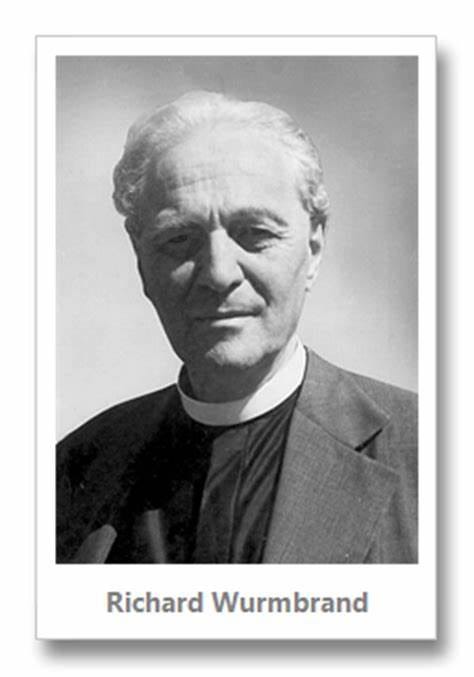
In The Answer to the Atheists Handbook, Richard Wurmbrand said:
“But every point of view is a point of blindness: it incapacitates us for every other point of view. From a certain point of view, the room in which I write has no door. I turn around. Now I see the door, but the room has no window. I look up. From this point of view, the room has no floor. I look down; it has no ceiling. By avoiding particular points of view we are able to have an intuition of the whole.”
Without intuition, we are unable to judge what is around us. It is vital that we get our intuition back.
Pastor Bumstead started his sermon talking about how hard it is to focus on our spiritual lives with all the distractions around us—something all of us can relate to. Prayer requires a still mind and an open heart, an almost impossible task when technology demands our undivided attention. This alone is enough reason to practice the discipline of prayer. It helps free us from the virtual prisons the gods of this world are trying to trap us inside.
Today, I came across this heartbreakingly beautiful example of people praying in a monastery for the last time.
Monastery’s last prayer: Thousands of Orthodox faithful came to Kiev-Pechersk Monastery today for the last Sunday prayer before the expulsion of the monks by Ukrainian authorities on March 29. pic.twitter.com/jzOL6O5c6E
— John Moran (@RueDaungier) March 26, 2023
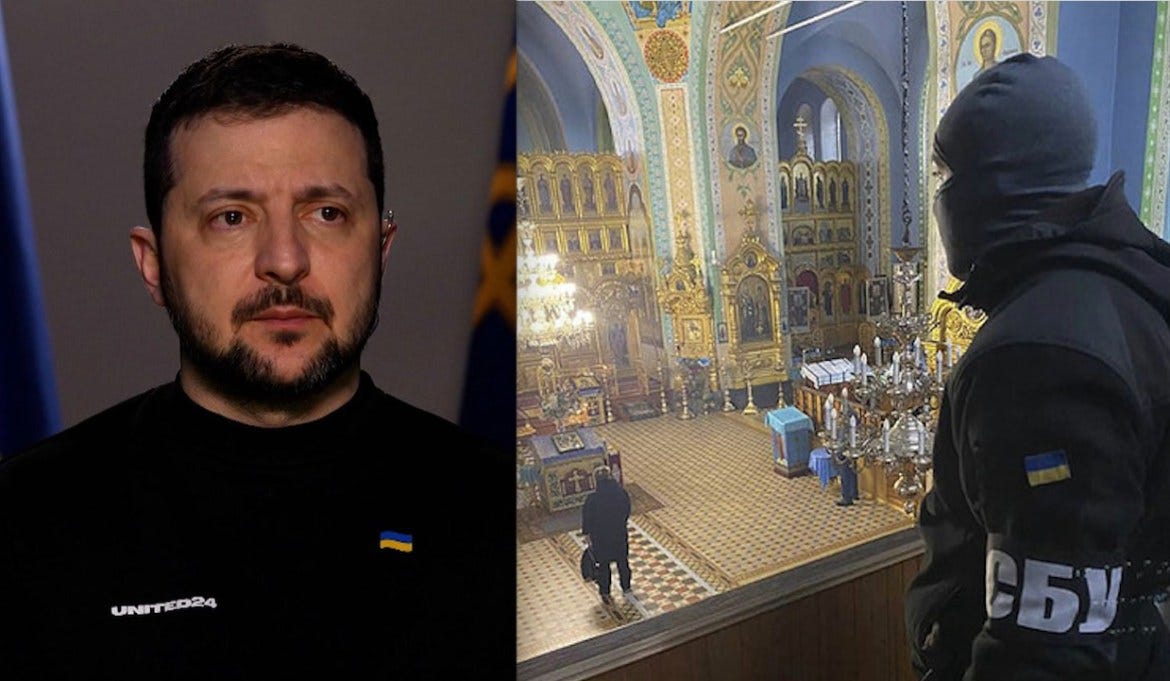
This assault on Christianity is intensifying around the world. Here are a few examples:
-
Between June and July 2021, 68 Christian churches in Canada were desecrated, damaged or destroyed.
-
In the same year, Edouard de Lamaze, president of the Observatoire du patrimoine religieux (Observatory of Religious Heritage) in Paris claimed that one religious building is disappearing in France every two weeks and that two thirds of fires in religious buildings are due to arson. To put that in perspective, “One mosque is erected every 15 days in France, while one Christian building is destroyed at the same pace,” Lamaze said.
-
In the UK over 2,000 churches have closed in the last 10 years. They are “the beating heart of villages, towns and cities”. Where will the people go for comfort, community and inspiration, especially in the inner cities, when the churches are gone. They will go inside virtual worlds and worship virtual gods, made for them by the elite.
God does not reside in a church. But churches are important gathering places for like-minded people to connect with God and one another. The elite don’t want us gathering in harmony like this. They want us to forget about God and to stop turning to him in our time of need. They want us turning to AI instead.
Holly Waters talks about the idea of Bot Gods. The video below shows robotic arms performing the aarti ritual in India, which involves lighting a candle to worship Hindu deities.
“Many scholars have pointed out that “robots, unlike people, are spiritually incorruptible. This not only makes robots attractive replacements for dwindling priesthoods but also explains their increasing use in everyday contexts: People use them because no one worries about the robot getting it wrong….” Waters writes.
We hear this all the time—that robots never get it wrong. They can’t lie. They are incorruptible.
Waters’ work on religious robots primarily centers on the notion of “divine object-persons,” where otherwise inanimate things are viewed as having a living, conscious essence.
A voice in the video says, “We love to see technology and we love to see something new. So why not use technology to propagate the mission of the Lord?”
This type of “mission of the Lord” is purposely moving followers closer and closer to transhumanism. Hinduism, Buddhism and other religions in South Asia are increasingly being imagined as post- or transhuman: deploying technological ingenuity to transcend human weaknesses because robots don’t get tired, forget what they’re supposed to say, fall asleep or leave.
It’s troublesome that people are so blind that they can no longer distinguish between the robots and God, when the difference should be obvious—if we still had our intuition that is.
The technological devices that offer us constant entertainment have desensitized us to the reality of good and evil. We no longer take it seriously. It’s just part of a video game or a movie, while “science” is what we believe in. But science is a con and entertainment is a drug. The forces behind both industries know there is a God and a Devil. They know exactly what they are doing by erasing that knowledge from people’s minds.
But the more they try to wipe God out, the more people are turning back to him.
On February 8th at Asbury University, in Wilmore, Kentucky, a group of about 20 students lingered after a chapel service had ended and began to worship and pray for one another.
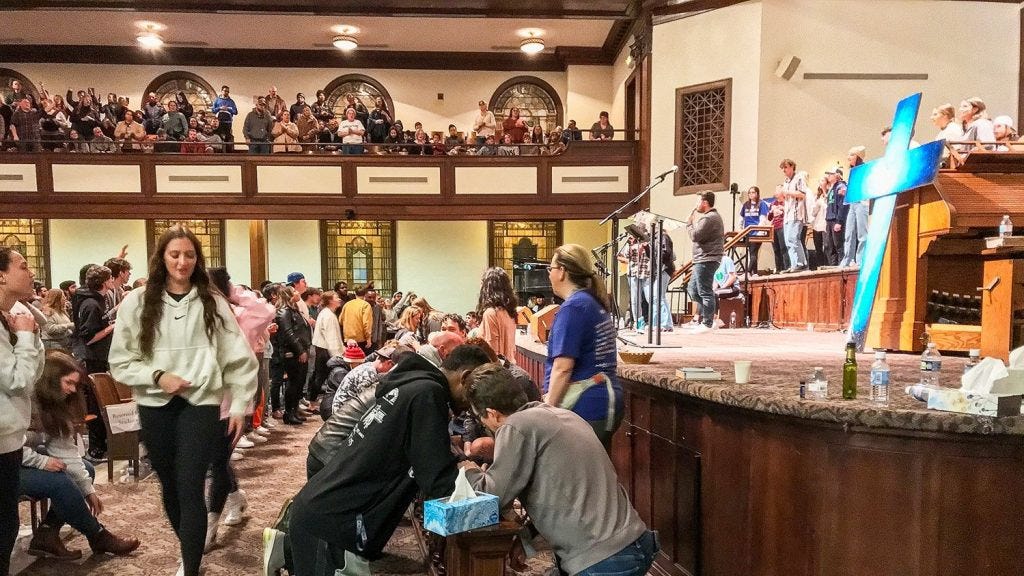
During his sermon that day, Zach Meerkreebs spoke about the call to “love without hypocrisy.”
“True love,” he said, “is humbling. It’s inconvenient. It’s sacrificial love.” “Love in action” means “prostrating yourself before God.”
The students that stayed and prayed, described how they felt an incredible peace descend upon the room. No one wanted to leave. Students who had gone to class returned when they heard what was going on. Faculty, staff, and community members joined them. The room became filled was voices raised in prayer and adulation.
As news spread, thousands of people began to show up from all over the country. What started as a simple talk by a preacher who at the time, didn’t even think he’d done a very good job of conveying his thoughts, extended into a 2-week worship and prayer-fest.
We will never know how long it could have gone on for or if it could have expanded beyond Asbury. Authorities shut it down, citing disruptions to the school and town. Before long, it had faded away from the public consciousness, replaced by new stories.
Imagine a revival like that sweeping across the world. Billions of people raising their voices to the heavens, praising God, calling on him for forgiveness and to lead us out of darkness and into the light. Forget the current protests in France, BLM and antifa riots during Covid, the January 6th “insurrection”, the war in Ukraine, the banking crisis, the threat of another pandemic, the fear of bioweapons and nuclear war. What if people refused to play these violent games anymore.
Jesus was the ultimate revolutionary, yet he gave himself up to his captors and commanded us to love our enemies. He sacrificed his life so that we could pray and be forgiven. This has been called “the Greatest Story Ever Told”. The elite want us to forget that story.
I have no doubt there are hundreds of thousands of ordinary people all across the world, praying that the stories of our connection to God and his son Jesus will not be forgotten. Somewhere there is a grandmother in a village or a monk on a mountaintop. The grandmother prays for the suffering children of the world while the monk prays for world peace. These are the real heroes that no one will ever know about. They maintain the balance of our world and keep us from tipping over into hell.
And then this morning I read this article: Sunlight in your bedroom could become a luxury as cities debate allowing landlords to rent windowless rooms in former office buildings to alleviate the housing crisis.
Why are those office buildings empty? Because so many businesses went bust during Covid. It didn’t happen by accident. They want people locked in prisons, hooked up to drugs to sedate them and a virtual world to entertain them. They want us all to forget that a real world ever existed at all.
The elites want to break our connection to God and replace it with a connection to the Vast Machine. They cannot bear that a single person should be free. They cannot tolerate that there is even one monk or one grandmother in a spiritual battle against them. Starlink’s 42,000 (and counting) satellites will search out and find every last renegade, forcing us all to submit to the vast machine or risk death.
As Dr. Yuval Noah Harari says, AI is going to know us better than we know ourselves. It will know our thoughts before we even think them.
But God already knows this. Our creator already knows us way better than AI or the elites ever will.
As David prays in Psalm 139
You have searched me, Lord, and you know me…. Before a word is on my tongue you, Lord, know it completely. You hem me in behind and before, and you lay your hand upon me. Such knowledge is too wonderful for me, too lofty for me to attain.
Where can I go from your Spirit? Where can I flee from your presence? If I go up to the heavens, you are there; if I make my bed in the depths, you are there. If I rise on the wings of the dawn, if I settle on the far side of the sea, even there your hand will guide me, your right hand will hold me fast.
David’s prayers bring us comfort. Being told AI will know us better than we know ourselves gives us nightmares.
In a recent New York Times op-ed, Harari, warns us that AI is feeding off of us, eating our stories, “hacking and manipulating the operating system of civilization”.
The article goes on to say, “AI could rapidly eat the whole of human culture—everything we have produced over thousands of years—digest it and begin to gush out a flood of new cultural artifacts.”
Bill Gates has warned the same thing, as has Elon Musk and many others. And yet, they are the ones who keep feeding AI. They want us to believe that “In the beginning God created the world” is a meaningless phrase that can easily be replaced with “In the beginning was the Big Bang”. Tomorrow it can be something else—anything except the Truth.
There can be no beautiful memories of long-gone days; no grandma connected to those powerful stories of old, telling them to her grandchildren at night by the light of the moon and the stars shining in the window. There can be no more magic or mystery. There can be no more unanswered questions that humble us before our Creator and help to strengthen our faith. All must be known. All must be explained away by the vast machine.
When I was fourteen years old or so, I read a book called Rees Howells INTERCESSOR, by Norman Grubb. It is the story of how “the faith and prayers of a humble coal miner affected the course of World War II”. A man who “progressed in faith until his prayers even altered world events”. If any of my readers have ever heard of this book, please let me know. I will be pleasantly surprised.
Now, why would I, a budding teenager who should have been preoccupied with clothes and boys, want to read a book like that? I had seen how my dad prayed as if God was real. I had met incredible people, like Richard Wurmbrand, who had been imprisoned for his faith in Romania and whose book Tortured for Christ sold more then 10 million copies. My mother told us stories of my own Mennonite ancestors who had refused to deny their faith despite torture, imprisonment and death from the Inquisition.
Rees Howells had been an intercessor. The book explained that “intercession so identifies the intercessor with the sufferer that it gives the intercessor a prevailing place with God.” It described how God would place a burden on Howell’s heart and he would pray and fast day after day, week after week, until his prayers were answered.
Filled with enthusiasm, I told my dad I wanted to be an intercessor, too. “I’m going to get up at 5 am every day and pray for two hours before school,” I declared.
“Why don’t you start with one hour,” Dad suggested with a smile. But I was determined. Rees Howells prayed for hours and hours every day. How would I ever learn to be an intercessor if I couldn’t even handle two?
Mom gave me an alarm clock and the next morning it went off at the brutal hour of 5 am. I didn’t want to get out of bed. But I did. I crept all the way to the playroom on the other side of the house, where I had decided I would pray, away from the temptation of my bed. I got on my knees, closed my eyes and started off by thanking God for his goodness. I then waited expectantly, thinking God would press upon me those he wanted me to intercede for. Nothing happened.
Why had it worked for Rees Howells? Well, of course, he had been much older and more experienced than me, I reasoned. He’d had the Welsh Revival of 1904 to inspire him. He’d experienced years of hardship, working in the coal mines while serving God, and then he’d given up even those small earnings to be a missionary in Africa. After that, he’d built and sustained the largest Bible College in Wales on prayer and faith alone, with a first investment of 2 shillings, 15 American cents.
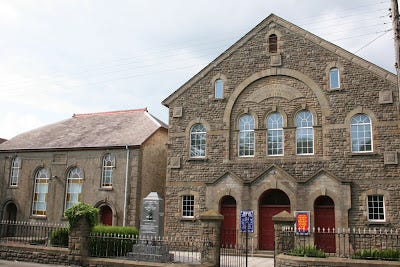
I felt foolish and discouraged. I wasn’t exactly on his level. What did I think I was doing? But I persevered. My mind wandered. I was cold and tired. And darn it, was I uncomfortable. Why did intercessors have to kneel? I didn’t remember reading anything that said that in the Bible.
I think I lasted all of 15 minutes that first morning. It didn’t get any better the next morning or the morning after that. By the third morning, I had gotten off my knees and had climbed into the reclining chair and fallen asleep. I don’t think I lasted even a week before I had given up entirely.
I didn’t become an intercessor. But I learned a respect for prayer those mornings that I never forgot. Prayer isn’t something to be taken lightly. It isn’t waving a magic wand and making things happen to your liking. It is an act of self-discipline and self-sacrifice. It can be wonderful, like the Asbury students felt. Singing and praising God. But to keep going isn’t easy. Mere enthusiasm dies out quickly. A hunger and a thirst to know God, to be his vessel to effect change in the world. That is something different.
It’s like exercising. We can get all excited and go out one day and run around the park and do a bunch of pushups and sit-ups and feel really proud of ourselves. But if we don’t do it the next day and the next, it won’t do us much good. Only by continuing, day after day, even on the days when we don’t feel like it, will we get stronger.
Prayer doesn’t have to be kneeling down like I thought I needed to do that morning. It doesn’t have to be all day long and accompanied by fasting like Rees Howell did. It doesn’t have to be in a church, and it doesn’t have to include certain recited words. It can happen anytime, anywhere, and unexpectedly. But you have to actually do it.
Almost everything that we strive to do that we think is changing things for the better, from our Twitter posts to the promises of exposing Big Pharma, to protests against corrupt governments, and on and on, don’t amount to much of anything in the long run. The prayers of a monk and a grandmother have more power.
A. W. Tozer said in “Preparing for Jesus Return: Daily Live the Blessed Hope:
“If man had his way, the plan of redemption would be an endless and bloody conflict. In reality, salvation was bought not by Jesus’ fist, but by His nail-pierced hands; not by muscle but by love; not by vengeance but by forgiveness; not by force but by sacrifice. Jesus Christ our Lord surrendered in order that He might win; He destroyed His enemies by dying for them and conquered death by allowing death to conquer Him.”
This is why Jesus’ life and death is the Greatest Story Ever Told and why the elite fear it and want us to forget it. What Jesus did by sacrificing his life for the world goes against everything the elites tell us we should strive for. Fame and fortune on TikTok, a bigger house in a virtual world, a surgically modified body. None of these things will ever make us happy. It didn’t work in the real world, and it will work even less in a fake one.
I encourage us all to try a little prayer. Just open our hearts to God’s voice. Connect to the real Creator and reject the lies of these earthly gods. This is the only way we will triumph in this spiritual war.


